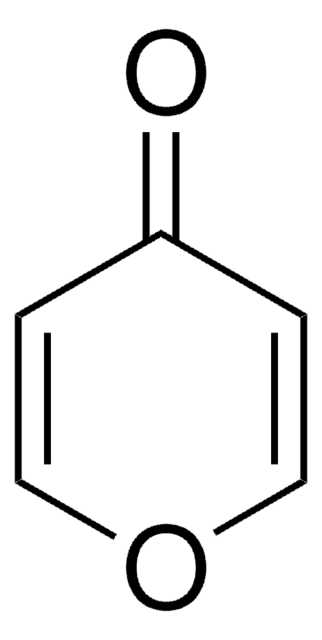W265608
Maltol
≥99.0%, FCC, FG
Synonym(s):
3-Hydroxy-2-methyl-4-pyrone, 3-Hydroxy-2-methyl-4H-pyran-4-one, Larixinic acid, Maltol
About This Item
Recommended Products
biological source
synthetic
Quality Level
grade
FG
Fragrance grade
Halal
Kosher
Agency
follows IFRA guidelines
reg. compliance
EU Regulation 1223/2009
EU Regulation 1334/2008 & 178/2002
FCC
FDA 21 CFR 117
FDA 21 CFR 172.515
Assay
≥99.0%
autoignition temp.
1364 °F
expl. lim.
25 %
mp
160-164 °C (lit.)
application(s)
flavors and fragrances
Documentation
see Safety & Documentation for available documents
food allergen
no known allergens
fragrance allergen
no known allergens
Organoleptic
caramel; jam; fruity; sweet
SMILES string
CC1=C(O)C(=O)C=CO1
InChI
1S/C6H6O3/c1-4-6(8)5(7)2-3-9-4/h2-3,8H,1H3
InChI key
XPCTZQVDEJYUGT-UHFFFAOYSA-N
Looking for similar products? Visit Product Comparison Guide
Application
- Maltol prevents the progression of osteoarthritis by targeting PI3K/Akt/NF-κB pathway: In vitro and in vivo studies.: This article details the mechanisms through which maltol mitigates osteoarthritis, focusing on its effects on key signaling pathways which could be beneficial for therapeutic applications (Lu et al., 2021).
- The Liver Protection Effects of Maltol, a Flavoring Agent, on Carbon Tetrachloride-Induced Acute Liver Injury in Mice via Inhibiting Apoptosis and Inflammatory Response.: This study explores maltol′s hepatoprotective properties, demonstrating its potential to inhibit apoptosis and inflammation in models of acute liver injury (Liu et al., 2018).
Signal Word
Warning
Hazard Statements
Precautionary Statements
Hazard Classifications
Acute Tox. 4 Oral
Storage Class Code
11 - Combustible Solids
WGK
WGK 2
Flash Point(F)
Not applicable
Flash Point(C)
Not applicable
Personal Protective Equipment
Choose from one of the most recent versions:
Already Own This Product?
Find documentation for the products that you have recently purchased in the Document Library.
Customers Also Viewed
Our team of scientists has experience in all areas of research including Life Science, Material Science, Chemical Synthesis, Chromatography, Analytical and many others.
Contact Technical Service












